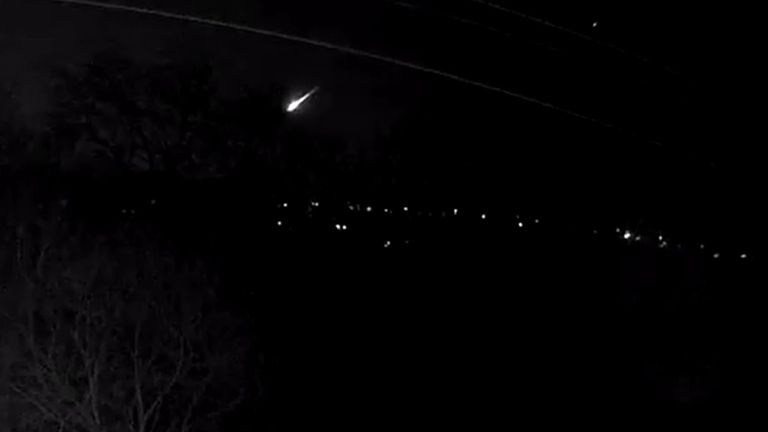A meteor lit up the sky over the UK on Sunday night, wowing amateur stargazers who were lucky enough to see the phenomenon.
Described as a "fireball" by the UK Meteor Network, it was spotted on cameras across the country falling slowly to the ground, with what appeared to be parts of debris coming away from it.
It was seen at around 9.55pm on Sunday, according to the network of meteor watchers, with around 120 sightings reported from as far north as Scotland and as far south as Somerset.
Scientists from the UK Fireball Alliance (UKFall), which is led by staff from the Natural History Museum, say it is likely that the fireball was a part of an asteroid falling to earth.
One Twitter user wrote: "Anyone else see the #meteor burn up over the UK just before 10pm tonight? I first thought it was a bright star or plane, then it got bigger & faster, then a huge flash lit up the sky & it burst into a massive tail of orange sparks trailing behind like a giant firework! So cool!"
Some even reported hearing a boom-like noise in the sky as it passed over.
Meteors are balls of space rock that burn up when they enter the earth's atmosphere. The UK Meteor Network says that the fireballs are often brighter than normal meteors and have a magnitude of -4 - similar to the planet Venus.
In comparison, the moon is -12.6 and the sun is -26.7, meaning the brighter the object, the lower the number.
Although meteors fall over the planet every day, the vast majority plummet into the sea, or into inhabited land. The UK Meteor Network records around half a dozen meteors a year.
UKFall was able to use videos to track its speed and orbit, and said it was travelling around 30,000 miles per hour, adding they believe it spent most of its orbit around the Sun travelling between Mars and Jupiter.
It is likely "a few fragments" reached the ground, UKFall said, even though it largely fragmented on its entry into the atmosphere.
"If you do find a meteorite on the ground, ideally photograph it in place, note the location using your phone GPS, don't touch it with a magnet, and, if you can, avoid touching it with your hands," said Dr Katherine Joy of the University of Manchester.
Dozens of sighting reports were made on social media, with many people sharing footage from their doorbell and dashboard cameras.
One social media user from Somerset said it sounded like an explosion, saying they "had the patio doors open, with the curtains closed over them.
"Was a very soft, muffled thud, followed by the heavy curtains blowing inwards, albeit very gently."
Another person in Streatham, in south London, said: "I saw 2 flashes as I was doing the dishes in SW16 then a green liked [sic] streaked back and forth at my window. I thought someone was targeting me with a laser and I ran out of the kitchen and turned off the light. Terrified."
Sunday's event is set to become the most-reported meteor ever, with more than 750 reports submitted to the International Meteor Organisation's website so far.




